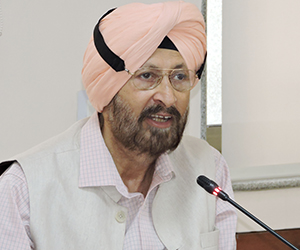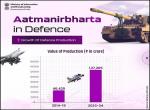Despicable Act
The Pakistan army's dastardly and utterly irresponsible behaviour in crossing the LoC, killing Indian soldiers and mutilating their bodies in an inhuman manner – including the ruthless beheading of one soldier – is reprehensible and worthy of condemnation in the strongest terms.
During the Kargil conflict in 1999 too the Pakistan army had returned badly mutilated bodies of Indian soldiers and had earned for itself the infamous epithet “rogue army”. Such incidents serve to further damage the dubious professional reputation of an army that has repeatedly let down its nation while claiming to be the sole saviour of Pakistan’s identity and its territorial integrity.
However, there is need for a measured Indian response at the diplomatic and military levels as the incident is in all probability a low-level violation of military ethics and conventions. It is unlikely to have been sanctioned by higher military commanders. India should demand the speedy trial of the soldiers involved in the brutal killings. If Pakistan’s response is unsatisfactory, India should suspend further discussion of peace and security and military confidence building measures (CBMs) in the resumed dialogue process. If Pakistan continues to stall on this issue like it has been dragging its feet on bringing to book the perpetrators of the Mumbai terror strikes in November 2008, the entire eight-point dialogue should be suspended.
The aim of initiating appropriate military measures should be to inflict deterrent punishment so that the Pakistan army learns the right lessons from its repeated violation of the code of conduct of military operations. Several direct and indirect military options can be exercised without unduly escalating the exchanges to dangerous levels. The most suitable response would be to raze to the ground the forward post of 29 Baloch Regiment from which the vicious attack took place. This should be done through the employment of direct firing weapons like bunker busting missiles and rocket launchers as well as devastating artillery and mortar fire.
As had been amply demonstrated during the Kargil conflict, India has a preponderance of artillery firepower – even if the guns are bordering on obsolescence – and this capability must be put to use. The guns are a custodian of the last resort of the country’s borders and send an unmistakable message when such a message is needed to be sent. The Pakistan army will retaliate but cannot hope to match India in a long-drawn exchange of artillery fire. Simultaneously, Special Forces must be used to degrade the Pakistan army’s logistics infrastructure in the areas behind the rogue post while remaining prepared for all contingencies that might arise.
Over the last three years and particularly in the summer of 2012, infiltration levels from across the LoC have risen sharply. The Pakistan army has been violating the cease-fire with impunity to push through its Jihadis under the cover of fire. It is obvious that protests at the diplomatic level have failed to elicit a positive response. It is now time to act decisively. The message must go home that while India has no grouse against the Pakistani people, its army’s cruelty will no longer be countenanced.
The people of India expect the government to respond appropriately. The government must convincingly demonstrate that there is a limit to Indian tolerance. The sacrifice made by the soldiers who have been martyred must not go in vain.
Pakistan’s Internal Turmoil
On a larger plane, the incident is likely to have been locally instigated, possibly in response to the killing of a Pakistani soldier during Indian retaliatory firing in the Uri Sector a week before the Mendhar incident. The Pakistan army has much to lose by activating the largely quiet Indian border when it is engaged in fighting major internal security challenges, even as the Pakistan government has been embroiled in countering continuing political turbulence, judicial activism, sectarian clashes and a stagnating economy.
The Pakistan army is facing, perhaps, its deepest crisis since its strategic blunder in Kargil. Its counter-insurgency policy has been unsuccessful and casualties have been mounting. The use of air strikes and helicopter gunships to attack terrorist hideouts has proved to be counter-productive. The Pakistan army has been forced by the TTP to wage a three-front "war": against the TTP and the Islamic Movement of Uzbekistan (IMU) in South Waziristan; against the anti-Shia Lashkar-e-Jhangvi (LeJ) in the sensitive Darra Adam Khel-Kohat area of NWFP and the Shia-dominated Kurram Agency of FATA; and, against the Tehrik-e-Nifaz-Shariat-e-Mohammadi (TNSM), headed by Maulana Fazlullah, and the Jaish-e-Mohammad (JeM) sheltering across the Durand Line in Afghanistan.
Though it has flirted with peace deals with the militants, the army finds it impossible to meet the demands of the TTP and the TNSM. According to B. Raman, a noted counter-terrorism expert, these demands include the suspension of all military operations in the tribal areas; the withdrawal of army posts from the FATA; the release of all tribals arrested under the Anti-Terrorism Act; the release of Maulana Abdul Aziz Ghazi and tribal students arrested during the commando action in the Lal Masjid of Islamabad in July 2007; and, enforcement of the Sharia in the tribal areas.
The US and its allies have become increasingly more frustrated by Pakistan’s failure to deal with al Qaeda and Taliban militants launching raids on US and NATO troops across the Durand Line. The Chairman Joint Chiefs of Staff of the US and other officials have been meeting General Kayani frequently to impress on him the need to be more pro-active in counter-insurgency operations. Unilateral trans-border intervention against militants inside Pakistani territory by the US is continuing through drone strikes. President Obama may soon approve trans-border ground action through Special Forces. Under these circumstances, it would be grossly illogical for the Pakistan army to activate the LoC with India.
Pakistan must Reduce Tensions
The Pakistan army must make amends for its grossly unethical conduct and completely stop further violations of the informal cease-fire along the LoC. It must also stop sponsoring terrorism, as promised by Musharraf in January 2003, or else it must be ready to face retaliation. General Bikram Singh, the Indian Army Chief, said during his press conference on the eve of Army Day that India reserved the right to retaliate at a time and point of its choosing. The IAF Chief has also stated that if Pakistan’s response is inadequate, other options will have to be considered. The Indian army has felt for long that the only place where it can gainfully hit back at the Pakistan army is at the LoC and it would make full use of a breakdown in the cease-fire. No one in India wants a complete reversal of the gains of the last ten years during diplomatic negotiations. However, when the need for self respect and national dignity is weighed against the gains of diplomacy, the balance will weigh heavily in favour of national dignity.
Pakistan’s political turmoil, internal instability, a floundering economy and weak institutions make for an explosive mix. It is apparent to even lay observers that the country is in for even greater difficulties ahead. Its leadership would do well to bring down the tension on the LoC.
Published Date: 15th January 2013










Post new comment